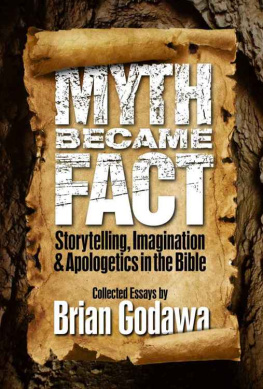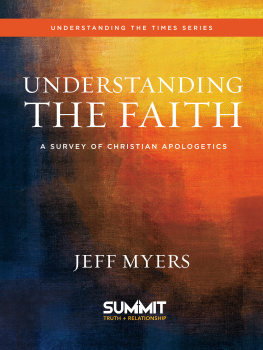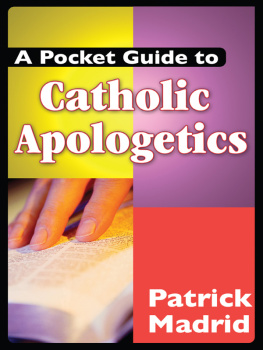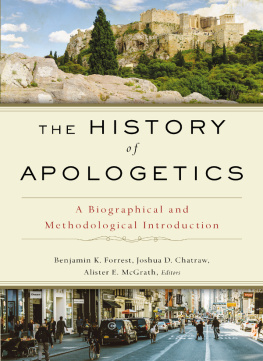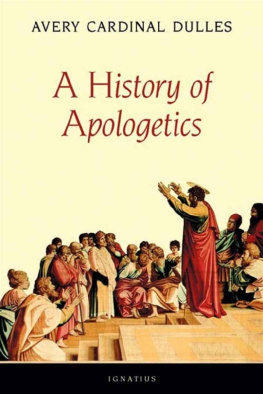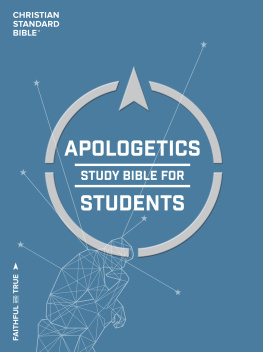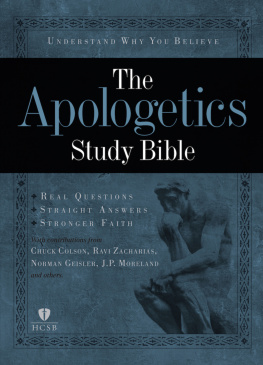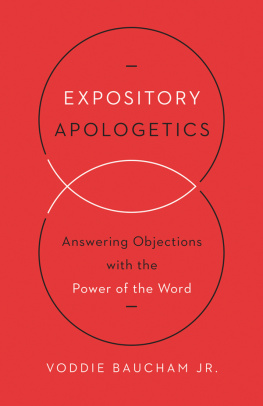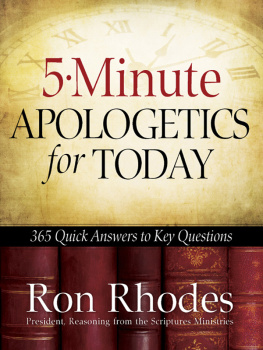Godawa - Myth Became Fact: Storytelling, Imagination, and Apologetics in the Bible
Here you can read online Godawa - Myth Became Fact: Storytelling, Imagination, and Apologetics in the Bible full text of the book (entire story) in english for free. Download pdf and epub, get meaning, cover and reviews about this ebook. City: Los Angeles, Calif, year: 2012, publisher: Embedded Pictures Publishing, genre: Religion. Description of the work, (preface) as well as reviews are available. Best literature library LitArk.com created for fans of good reading and offers a wide selection of genres:
Romance novel
Science fiction
Adventure
Detective
Science
History
Home and family
Prose
Art
Politics
Computer
Non-fiction
Religion
Business
Children
Humor
Choose a favorite category and find really read worthwhile books. Enjoy immersion in the world of imagination, feel the emotions of the characters or learn something new for yourself, make an fascinating discovery.
Myth Became Fact: Storytelling, Imagination, and Apologetics in the Bible: summary, description and annotation
We offer to read an annotation, description, summary or preface (depends on what the author of the book "Myth Became Fact: Storytelling, Imagination, and Apologetics in the Bible" wrote himself). If you haven't found the necessary information about the book — write in the comments, we will try to find it.
Godawa: author's other books
Who wrote Myth Became Fact: Storytelling, Imagination, and Apologetics in the Bible? Find out the surname, the name of the author of the book and a list of all author's works by series.
Myth Became Fact: Storytelling, Imagination, and Apologetics in the Bible — read online for free the complete book (whole text) full work
Below is the text of the book, divided by pages. System saving the place of the last page read, allows you to conveniently read the book "Myth Became Fact: Storytelling, Imagination, and Apologetics in the Bible" online for free, without having to search again every time where you left off. Put a bookmark, and you can go to the page where you finished reading at any time.
Font size:
Interval:
Bookmark:
Other books by the Author
Chronicles of the Nephilim Saga
Noah Primeval
Enoch Primordial
Gilgamesh Eternal
Hollywood Worldviews: Watching Filmswith Wisdom
and Discernment (InterVarsity Press)
Word Pictures: Knowing God ThroughStory and Imagination (InterVarsity Press)
Movies written by the Author
To End All Wars
The Visitation
Alleged
Change Your Life
Documentaries written and directedby the Author
Wall of Separation: The Phrase thatDivided America
Lines That Divide: The Great StemCell Debate
Schools Out: Academic Freedom Vs.Political Correctness
For more information and products bythe author,
see the back pages of this book or go to:
http://www.ChroniclesOfTheNephilim.com
http://www.godawa.com
Myth Became Fact
Storytelling, Imagination
& Apologetics in theBible
By Brian Godawa
Copyright 2012Brian Godawa
All rightsreserved.
Embedded PicturesPublishing
Los Angeles,California
310.948.0224
www.embeddedpictures.com
Scripture quotations taken from The Holy Bible: English StandardVersion. Wheaton: Standard Bible Society, 2001.
Table of Contents
Genre
This book is a compilation of various publishedarticles and book chapters by Brian Godawa. There will be some minor overlap ofcontent in some of the chapters.
Specialthanks to my editor, Don Enevoldsen .
Of Myth and the Bible
Whenever I consider that I have something important to sayabout faith, imagination, and/or apologetics, I usually discover that C.S.Lewis has already said it long before I could, and he has said it better than Iwill. True to form, the title of this book MythBecame Fact , is actually the title of a famous essay by the late Lewis that describes theheart of Christianity as a myth that is also a fact. He comforts the fearfulmodernist Christian whose faith in the Bible as a book of doctrine and abstractpropositions is suddenly upset by the frightful reality of the interaction ofholy writ with legend, pagan parallels, and mythology.
Rather than deny the ancient mythopoeic nature of Gods Word as modern Evangelicals tend to do, Lewis embraced it asa reflection of Gods preferred choice of concrete communication overabstraction (the worshipped discourse of the modernist). He understood myth tobe the truth embedded into the creation by the Creator in such a way that evenpagans would reflect some elements of that truth. Thus, when God Himselfincarnates truth into history in the life, death, and resurrection of JesusChrist, it is no surprise that it takes on mythopoeic dimensions reflected inprevious pagan notions of dying and rising gods.
He concludes his essay with these memorable words:
We must not be ashamed of the mythical radianceresting on our theology. We must not be nervous about parallels and paganChrists they ought to be there it would be a stumbling blockif they werent. We must not, in false spirituality, withhold our imaginativewelcome. If God chooses to be mythopoeic and is not the sky itself amyth shall we refuse to be mythopathic? For this is the marriage ofheaven and earth: perfect myth and perfect fact: claiming not only our love andour obedience, but also our wonder and delight, addressed to the savage, thechild, and the poet in each one of us no less than to the moralist, thescholar, and the philosopher.
Now, any book that uses the word myth in its title andattempts to address this concept in a Biblical context had better define someterms, because a common reaction of many Christians is often one of mistrust.In their minds, myth means false, and since the Word of God can never befalse, the category of myth is anathema in relation to the Bible.
But this is not an accurate assessment of the variedunderstandings of myth. Because of a modernist bias of anti-supernaturalism,some scholars define myth as a necessary and universal form of expressionwithin the early stage of mans intellectual development, in whichunexplainable events were attributed to the direct intervention of the gods. Insome critical and liberal quarters of theology, this connotation has stuck tothe meaning of myth and certainly warrants critique in light of its prejudicialdefinition that assumes a materialist universe without supernatural agents.
But a more specific and recent definition of myth isappropriate to our discussion. In this sense, myths are, as Northrop Frye hasexplained, stories that tell a society what is important for it to know,whether about its gods, its history, its laws, or its structures. Inthis sense, mythical stories, whether historically factual or fictional, do thesame thing; they reveal true transcendent meaning. By this definition, callingthe Bible mythical in some of its characteristics or imagery is not tojeopardize its historical claims. In fact, the Bible often claims to reveal theunseen transcendent meaning and purposes behind imminent historical events.Thus, Lewis phrase, myth became fact.
The problem comes when Christians seek to protect theBibles reliability by demanding it be historical or factually accurateaccording to modern definitions of history writing and factual reporting orobservation. They conclude that if the Bible is not accurate according to theplain reading of the text, then it cannot be relied upon to be truthful aboutthe more important issues of God and salvation.
Let the reader be careful to note that I did not deny thehistoricity of the Bible, but I did make a distinction between our modern notion of what constituteshistorical writing (historiography) and the ancients notion of whatconstituted historical writing. For us to demand that the Biblical text bescientifically or historically accurate aswe define those terms is not a high view of Scripture, it is a low view of Scripture. It is in factimposing our own prejudices upon the text by refusing to understand it withinits context. This is called cultural imperialism and it is the height ofhubris, or human pride.
One example of this kind of modern hubris in defininghistory can be found in the notion of genealogies. In the Bible, genealogies areoften used as apologetic tools to prove chosen lineage. The modern notion ofhistorical precision and chronological accuracy is not always a part of theBiblical understanding of genealogy that prioritizes theological truth overhistorical veracity. The genealogical formula of Genesis, X is the son of Ythat once was interpreted as the plain reading of literal sons is nowuniversally acknowledged to involve historical gaps which renders the term sonof as often figurative and not literal. X is the son of Y often means, X isa descendent of Y. This is not liberal denigration of the Bible, it is theBibles own context of meaning when it comes to genealogies.
The most important genealogy to Christians is of course thatof Jesus Christ, the Son of God and Son of David. In Matthew chapter 1,Matthew details Christs genealogy and concludes, So all the generations fromAbraham to David were fourteen generations, and from David to the deportationto Babylon fourteen generations, and from the deportation to Babylon to theChrist fourteen generations (1:17). So Matthew uses Christs genealogy as anapologetic by exegeting the symbolic number of 14 as being historicallysymmetrical in the lineage. Theres only one problem: Its not historicallyaccurate at least by our definition of history. And it is the Bibleitself that proves this, not liberal theology.
As Bible commentator Craig Blomberg explains,
The actual number of generationsin the three parts to the genealogy are thirteen, fourteen, and thirteen,respectively When one compares the genealogy with Lukes account (Luke3:2337) and with various Old Testament narratives, it is clear thatMatthew has omitted several names to achieve this literary symmetry.
Font size:
Interval:
Bookmark:
Similar books «Myth Became Fact: Storytelling, Imagination, and Apologetics in the Bible»
Look at similar books to Myth Became Fact: Storytelling, Imagination, and Apologetics in the Bible. We have selected literature similar in name and meaning in the hope of providing readers with more options to find new, interesting, not yet read works.
Discussion, reviews of the book Myth Became Fact: Storytelling, Imagination, and Apologetics in the Bible and just readers' own opinions. Leave your comments, write what you think about the work, its meaning or the main characters. Specify what exactly you liked and what you didn't like, and why you think so.

